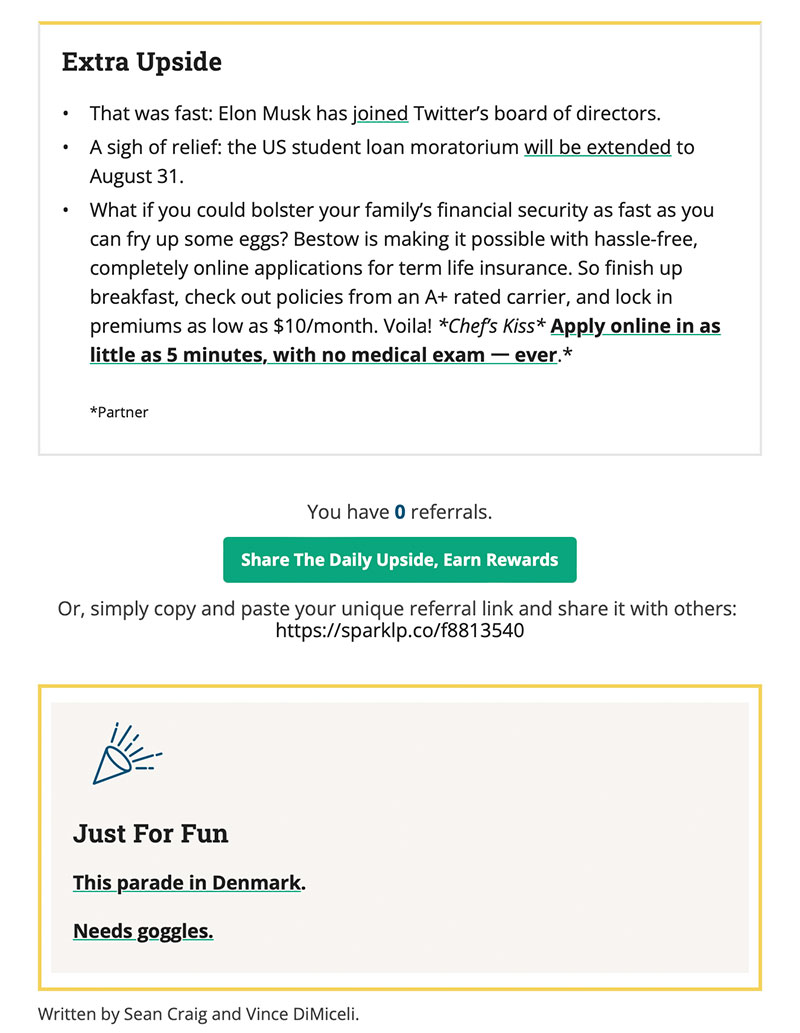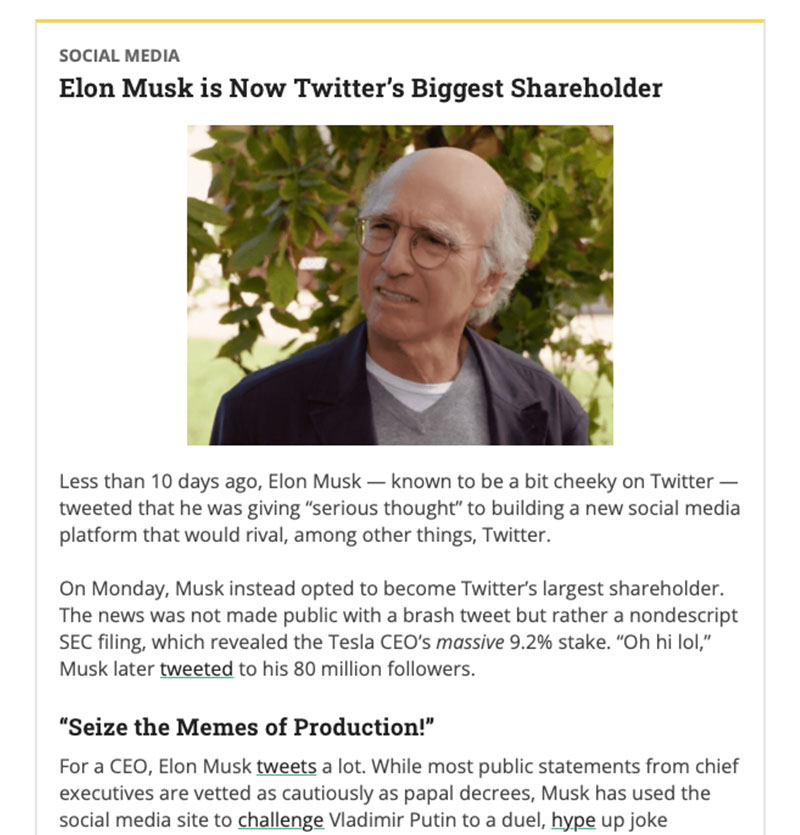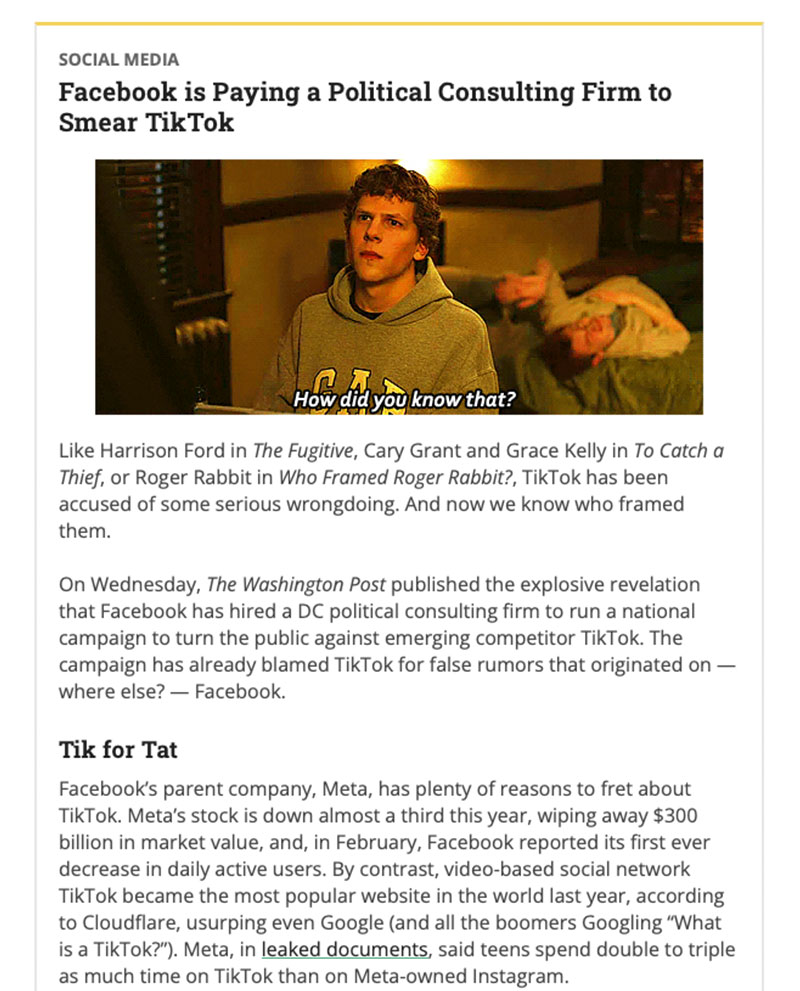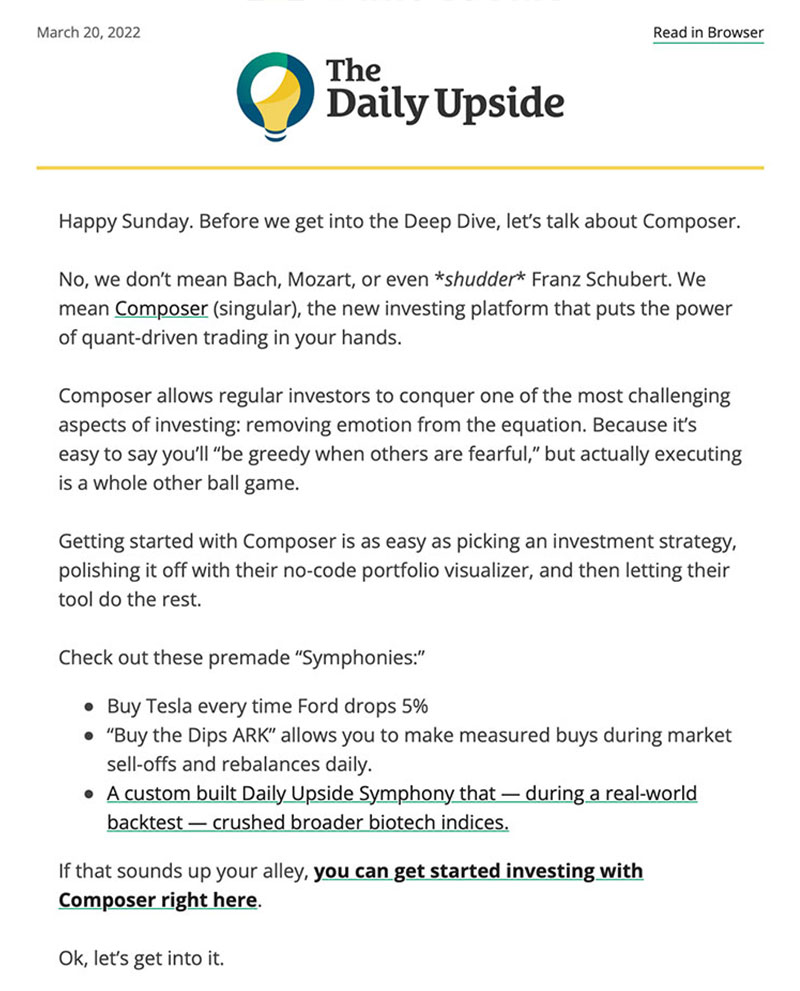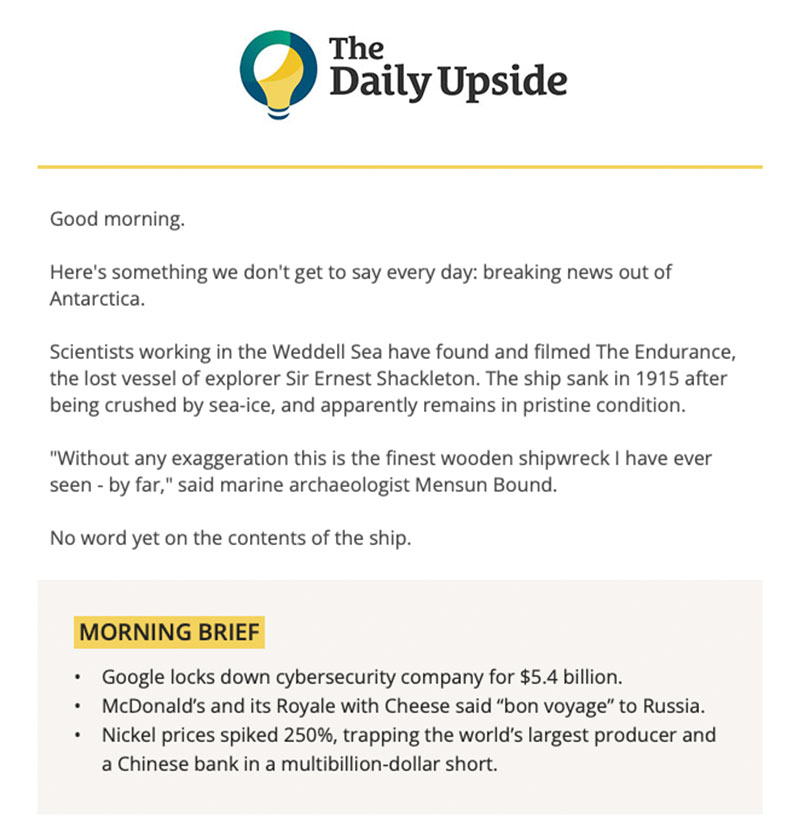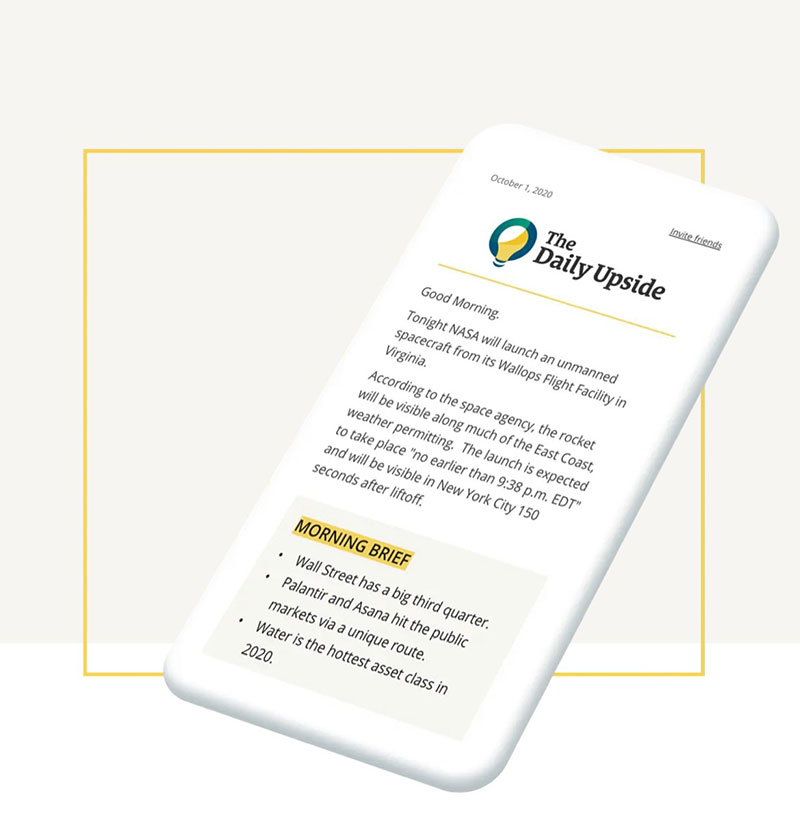This review seeks to determine just how broad an appeal The Daily Upside newsletter has, and whether it’s something you’ll actually want to read. Here’s the truth about the news: Much of it falls on deaf ears. Even if it’s well reported and factual, the vast majority of audiences have vanishingly little ability to take action on what they read. It could just be reader apathy, especially since so many publications consider their audience more by growth statistics than a common interest. “Something for everyone” is hardly the recipe for a balanced news diet of any particular fortitude. On the other side of the coin are news sources that are overly niche. Perhaps the information is arcane or overly technical, or maybe it’s heavily biased to fit a specific audience’s predilections. There’s a fine line to walk. And given that TDU is helmed by a former investment banker, you may wonder how well they’re walking it. I spent the last two months subscribed to The Daily Upside newsletter to help you make that call.
First, Who Should Read a Financial Newsletter?
Look, I’m not over here counting my millions in preparation for the next auction for seized oligarchical yachts. Instead, I contribute as much as I can to my Roth IRA, dink around on Robin Hood (mostly for the memes), and shake my fist at inexorably rising property taxes along with pretty much everyone else fortunate enough to focus on first-world problems. In the course of conducting research for this review, I came upon a message from one of TDU’s advertisers that nearly caused a spit-take: If you’re in the same boat (re: NOT a yacht), you may naturally wonder just how much you have in common with this “target audience”. Actually, everything. Just look at any poll for “things that should be taught in school but aren’t” on a Google search, and you’ll see personal finance pretty much every time. Of course, The Daily Upside isn’t a how-to publication for fiscal responsibility. But, by viewing the news through the lens of finance and investing, astute readers will organically build up a context for why it matters to play it smart. That means, absolutely everyone stands to benefit from this “niche” news source.
What to Expect from The Daily Upside
First, you can expect daily news briefings delivered to your inbox–with the exception of Saturdays. Emails usually ping between 8:30 am and 10:00 am EST. This is right about the time many folks are hitting up the office’s coffee maker. Related Reading: 1440 Newsletter Review
The “Good Morning”
Kicking off each edition of The Daily Upside newsletter is the day’s choicest nugget of food-for-thought, presented in 100 words or less beneath a simple “Good morning.” Usually, the topic is business or finance related, but definitely not always (as evidenced in the screenshot above!) Precisely no time is spent burying the lede; its water-cooler tone conveys the facts upfront, with a dash of editorial pithiness to help you chew on the message just that meaningful bit longer. This is pretty much the rule except for Sundays, when TDU swaps out the standard news-laced salutation for a mini review (≤150 words) of myriad tools, services, and opportunities the target audience might find interesting. It might be an automated tool to buy the dip, or perhaps a service helping you build a tax-advantaged portfolio off the back of structural opportunities hidden in the arcane US tax code. Whatever the case, if you’re fundamentally averse to affiliate placement, don’t hit the eject button just yet. The flavor is about as offensive as putting Motley Fool and Popular Mechanics together in a Vitamix–that is to say, it’s well-considered and quite relevant–even if it does deviate from a strict focus on current events.
The Morning Brief
Here’s where you get your headlines for the day; three brief bullet points tease the focus of the Deep Dive topics below. There’s just enough information to justify opening the email, without obligating you to read further if you’ve only got a moment to spare. Sure, the longer form content is just a single swipe-scroll away. But let’s face it, sometimes skimming the headlines is the order of the day, and it’s nice that the Daily Upside picked a page structure to reward both types of reading.
The Deep Dive
If you’ve got the time for something more substantial than a quick-fix, The Daily Upside delivers in spades. Their three (unofficially named) Deep Dive sections directly correspond to and expound upon the Morning Brief bullet points. Rather than simply rounding up a crop of externally linked articles with a brief synopsis each, The Daily Upside opts for original journalistic content right on the page. Each section is under 400 words, which takes less than a minute and a half to read. Though, while the form factor is bite sized, the value contained therein is anything but. Whether it’s insights about post-Covid workforce trends, pharmaceutical breakthroughs, acquisitions and IPOs, corporate cooperation to reduce EV production costs, or even Elon Musk’s latest tweets, anything that could impact your financial health (including that of the world around you) is fair game for coverage. Like any good newsletter, the content is both skimmable while rewarding a closer read. Each mini story has plenty of hooks, headlines, bullet points, and even a humorous .gif thrown in for good measure. Rarely, though, does The Daily Upside explicitly tell you how and whether to take action on a given piece of information. Instead, they provide the most pertinent details of a story, break down why it all matters in context, and conclude with a digestible takeaway. The Daily Upside rolls with the show-don’t-tell journalistic ethos, and it’s downright refreshing in this era of punditry.
The Extra Upside
Essentially The Daily Upside’s “lightning round”, which contains miscellanea and minutiae that doesn’t fit into the main structure of the newsletter but is still worth mentioning. Once again in bullet-point form, the Extra Upside pairs a couple of welterweight, slightly editorialized headlines with a message from their sponsors. The scope of these tidbits wanders well outside of the scope of financial news; each stands alone as informational digestifs that neither beg nor offer further reading. You might say it’s just for fun, but the news presented is self-evidently consequential. And anyways, there is a capstone literally labeled “Just For Fun” at the very end, usually taunting your curiosity with a wink and one-to-two-word hyperlinks. These often lead to tweets, YouTube videos, TikToks, or really anything designed to make you laugh and/or think. The Extra Upside is a little reward for anyone with the sheer force of will to fix their attention on-page for the five whole minutes (otherwise known as an Internet eternity) it takes to read an entire issue of The Daily Upside.
The Downside? (How TDU Handles Ads)
In reviews like this, I like to devote a short section talking about how a publication monetizes their efforts, because it really does affect the user experience and even the content itself. It’s a fact of digital life that if a product is offered for free, you the reader are actually the product. And that usually translates to ads, which we all hate, right? Well, there’s a right way to do it and a wrong way. The wrong way would be flashing banner ads, auto-play video popups, undisclosed affiliate links, and more simply but most sinfully–irrelevant content. We’ve already touched on ads a bit with TDU’s Sunday editions, which straight-up lead with a promotion. However, it’s worth reflecting upon why savvy newsletter curators would make such a bold decision. Basically, if they thought it wouldn’t interest you, there’d be every incentive in the world to do things differently. Maybe they’d pick different products, or more likely punt it down the page after you’ve already gleaned some value. The data doesn’t lie, and newsletters have a hard obligation to do everything they can to maximize reader engagement. TDU is clearly quite judicious with whom they choose to do business; and thus confident in their recommendations to check their partners out. Moreover, the promotional sections use the same journalistic devices to earn and keep your attention found throughout the newsletter. The tone, timbre, and intent all match up to deliver a logical, unbroken flow of information. It’s just that some of that information happens to be advertorial in nature. If ads are an inescapable downside to unpaid content, The Daily Upside offers a masterclass in how to respect your audience, maintain content integrity, and ensure your newsletter is profitable enough to continue delivering real value.
The Daily Upside Review: Verdict
One thing you should know, I am rather fanatical about email hygiene. No, I’m not one of those superhumans who maintains “inbox zero”, but I hold absolutely no truck with stupid, pointless, annoying messages. If it fails to deliver value, I race to find the “unsubscribe” button. I might even banish it to the spam folder if I’m feeling particularly vindictive. Related Reading: 22 Best Newsletters You’ll Actually Read So what keeps The Daily Upside spice flowing into my inbox?
It’s Relatable
First, TDU doesn’t talk past their audience. As previously mentioned, I’m definitely closer to Joe Sixpack than Mr. Diamond Hands. But complex financial stories are, as a rule with this newsletter, broken down into language I not only understand but find meaningful.
It’s Readable
Second, I’m actually a pretty big believer in the daily digest. Especially as an antidote to endless “doom scrolling” that can happen with dedicated news sites and fora. (Looking at you, Reddit!). My attention span is as limited as anyone else’s. So, it’s important that my newsletters cater to the panorama of my moods and methods. (If they hold a hope to actually get opened and read, that is.) Whether I scan the page or read it from header to footer, I can close out an issue of The Daily Upside with that dopamine hit of accomplishment that says “good job, you did something smart instead of brainless!” (Ask my wife–this is not something to be taken for granted!)
It’s Real News
Finally, and perhaps anecdotally, I admire the craft of TDU’s journalism–call it an occupational hazard. But it’s a fine line balancing that all-important “human touch” against the profit-driven tendency towards editorial punditry. Absent is the tribalistic soma of hot-take info-tainment that so depressingly courts the lowest common denominator of cultural division. In the age of fake news and “fake news”, The Daily Upside delivers on its namesake. TDU offers a constant positive reminder that somewhere, somehow, someone gives a damn about making factual information readily available to a public sorely in need. That such a publication happens also to focus on cultivating financial savvy among its readership proves that unicorns do exist.


